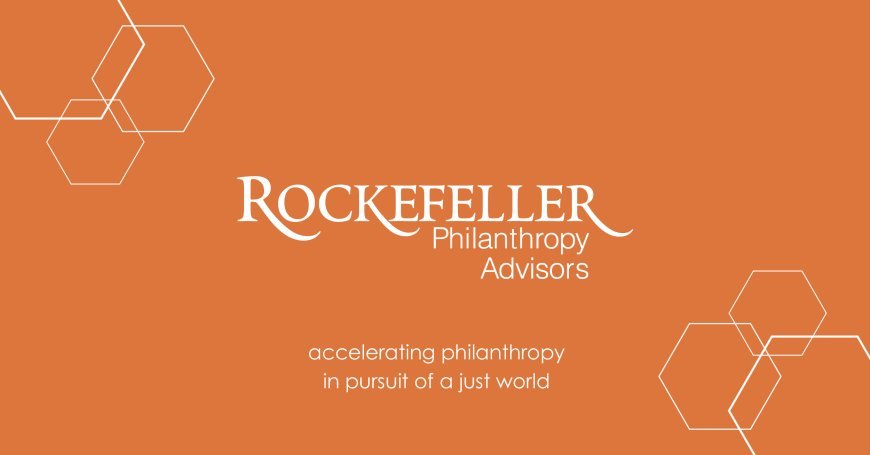Journey to a New CEO
A conversation between Valerie Rockefeller and Renee Karibi-Whyte Selecting the right leader—particularly when that leader will replace a CEO that has been in place for decades—is crucial for any organization. This process takes on added significance in the philanthropic sector, where leadership not only shapes organizational strategy but also influences broader societal change. The recent […] The post Journey to a New CEO appeared first on Rockefeller Philanthropy Advisors.

A conversation between Valerie Rockefeller and Renee Karibi-Whyte
Selecting the right leader—particularly when that leader will replace a CEO that has been in place for decades—is crucial for any organization. This process takes on added significance in the philanthropic sector, where leadership not only shapes organizational strategy but also influences broader societal change. The recent experience of Rockefeller Philanthropy Advisors (RPA) in appointing Latanya Mapp as its new CEO exemplifies the careful approach needed in such a search, offering practical insights for similar organizations.
RPA Board Chair Valerie Rockefeller shares with Senior Vice President Renee Karibi-Whyte her reflections on this journey, highlighting the steps and considerations that led to a successful outcome. As more and more women are stepping into the top roles in the sector, the importance of an intentional, inclusive search process that aligns with organizational values is paramount. This conversation sheds light on the importance of establishing clear, values-aligned criteria for selection, the need for diversity and inclusivity in the candidate pool, the role of stakeholder engagement in the search process, the advantages of partnering with professional search firms, and the imperative of maintaining transparency and fairness throughout.
Renee Karibi-Whyte [RKW]: Hello, Valerie! You must be relieved and thrilled that the word is now officially out about RPA’s new CEO. Can you provide an overview of the CEO transition process at RPA and the importance of this transition for the organization’s future?
Valerie Rockefeller [VR]: Melissa Berman’s typical thoughtfulness in announcing her retirement in the midst of our 20th anniversary celebrations allowed us a hint of opportunity to honor her despite her protestations. Even more importantly, Melissa gave us the gift of time by committing to staying on for one year, which allowed us to launch a process worthy of RPA.
Because the Board’s main responsibility is hiring and supporting a CEO, we created a search committee that included our nominating and executive committees.We narrowed down a longer list of executive search firms—there was great demand for the job—to four, which we interviewed. Isaacson Miller prevailed and were excellent partners throughout, reviewing more than 400 credible candidacies and guiding us through six in-person interviews to narrow the search to the final three, who also spoke with Melissa and the executive team. Appropriately, that was Melissa’s only involvement in the process. The executive team then shared feedback that informed the search committee’s final decision.
In terms of the organization’s future, our more explicit focus on social justice and expanding global presence reflect core RPA values, so the transition from a founding CEO will be one of ongoing evolution rather than a turning point. The transition is inherently significant because leaders are so impactful, so the importance of this one is that we are well poised to continue internal systems reform while continuing to broaden our reach.
RKW: What were the key objectives and criteria that guided the recruitment process for the new CEO?
VR: We used similar criteria to choose the search firm and the finalists as both decisions were about people at the forefront of inclusive philanthropy who understood RPA enough to appreciate our strengths as well as areas for growth. The requirements were high moral character, commitment to equitable excellence, sectorial expertise, cultural competence, proven success managing through growth/change and strategic as well as visionary thinking capacity.
To be precise, the qualities listed on the position description included:
- Informed passion and sense of urgency for the mission, values and legacy of RPA
- The highest level of personal and professional integrity and demonstrated commitment to justice, equity, diversity and inclusion
- Exceptional communication skills and the ability to relate across sectors, disciplines and cultures; sophisticated understanding of the role of media and social communications in driving change
- Leadership experience within a multi-faceted, sizable institution, preferably one that operates across diverse geographies and cultures
RKW: In the context of RPA’s position in the philanthropic sector as a leading advisor, fiscal sponsor, convenor and thought leader, were there any specific challenges or opportunities that influenced the criteria and qualities sought in the new CEO?
VR: Our challenges reflect the opportunities we’ve had to lead – rapid growth that sometimes overstrained our systems, onboarding new colleagues to cultivate belonging and efficacy and managing global fiscal sponsorships and consulting projects through the intensity of the pandemic and racial reckoning. RPA operates at a high level, requiring someone who can manage internal complexity while maintaining a high external profile.
RKW: Please describe the steps taken to identify and attract a diverse pool of qualified candidates for the CEO position. How did the Board ensure transparency and inclusivity in the recruitment process? What specific tools, assessments or methodologies did it use to evaluate candidates’ qualifications, leadership styles and alignment with the organization’s values?
VR: Isaacson Miller and RPA posted the position description throughout social media and on our respective websites for self-nomination and reached out to nonprofit CEOs who weren’t seeking jobs but who Isaacson Miller or others identified as well qualified. Isaacson Miller reviewed resumes and cover letters to narrow down the applicant pool to about 20 people, which the search committee then evaluated. We were thrilled by the diversity of candidates in terms of backgrounds and demographics.
Our anti-bias training helped us focus on demonstrated skills more than personal characteristics. Our lead search partners were a white woman and a Black man, and our earliest questions addressed commitment to diversity, equity, justice, and inclusion. We also did deep referencing, formal and informal, to surface any evidence of either problematic behavior or exemplary inclusivity.
We also sought as much input as possible from inside and outside the organization. Nobody knows what RPA needs better than our colleagues, so we read every answer from the March survey with the following questions:
- What do you see as the key objectives for the incoming president? After three to five years, what would be the indicators of success?
- What aspects of RPA’s organization, culture and approach would you like to see the new president reinforce and extend? Where should he/she lead growth or change?
- Based on objectives, what do you think are the qualifications and experience required of an ideal candidate? What’s essential and what might be helpful? What sort of cultural competencies will be required to lead effectively within our diverse global organization?
- What are the personal attributes most important for this role?
RKW: What qualities and qualifications set Latanya Mapp apart from other candidates? Were there specific experiences or achievements in her background that made her an exceptional fit for RPA?
VR: Our thorough process yielded outstanding finalists, all of whom had the heart and mind to lead RPA. Latanya shared similarities with the others, but her presence and experience shone the brightest. She has a brilliant international reputation and has brought calm confidence to crises. She has direct experience with sponsored projects through the Global Fund for Women, which she grew from $17 million to $78 million in assets dedicated to gender justice. She grew up in Philadelphia after her family escaped the Jim Crow South, and as the only one of her three siblings to make it to college, Latanya has served with gratitude in roles ranging from the NAACP-Legal Defense Fund human rights lawyer to a USAID civil servant to a global nonprofit CEO.
I’ll quote her cover letter for direct insight: “As I navigated droughts, wars, the Middle East politics, and the international development complex, I learned quickly that focusing my work on progress within a justice framework ensured those most affected by a particular issue were also those with solutions to ensure sustainable and transformative change. As I rose through the ranks in the UN, US Diplomatic Corp, international NGOs, and most recently the philanthropic spaces, I am now convinced more than ever that my background, skills, and experiences prepared me well for servant leadership to guide and protect while delivering on missions that drive social change.”
RKW: Where there any standout moments that reaffirmed the decision during the selection process?
VR: The first time we interviewed Latanya was on Zoom because she was about to speak at a conference in Rwanda. She was so compelling virtually that our expectations were high for our in-person meeting, where we enjoyed even more of her wisdom, eloquence and humor. Latanya has enormous external gravitas, so I particularly recall her saying she would never reschedule an executive team meeting for a CNN interview because the team always comes first. The assertion underscored her primary commitment to internal operations and culture.
RKW: Melissa was RPA’s founding CEO and led the organization for more than two decades. From your perspective as current board chair, what legacy did she leave behind, and how does this transition represent a significant milestone for RPA?
VR: Melissa’s legacy is literally definitional. RPA’s numbers – from clients, to countries it serves, to dollars earned, to media mentions and to publications created – are staggering. Melissa had to ensure financial sustainability of an organization whose culture and infrastructure she was simultaneously creating. Every individual at RPA has an equally important story, but Melissa’s earliest colleagues were with her through an epic novel of change. All of us fortunate enough to work with Melissa would say her relationships are her legacy. Her gifts to the field are her ability to think quickly on multiple levels; her creativity around ways to serve nonprofits, donors and the field; her endless curiosity; the professionalism with which she shows respect to partners and her eloquence promoting the power of philanthropy.
RKW: Based on your experience, what advice do you have for other organizations going through a CEO search in the philanthropy sector?
VR: Melissa showed enormous character and discipline by maintaining a distance that allowed us to start with an open mind. Her flexibility around timing allowed Isaacson Miller to do extensive outreach and for our committee to have long, well-informed conversations about the qualities we needed and about the candidates themselves. Meeting each finalist twice as a group and having them meet Melissa, the executive team and me individually meant they had a strong sense of us, too. We were extremely careful about confidentiality out of respect as well as desire to keep everyone we wanted in the process. That being said, in general it takes transparency to achieve equity.
The post Journey to a New CEO appeared first on Rockefeller Philanthropy Advisors.
What's Your Reaction?



















